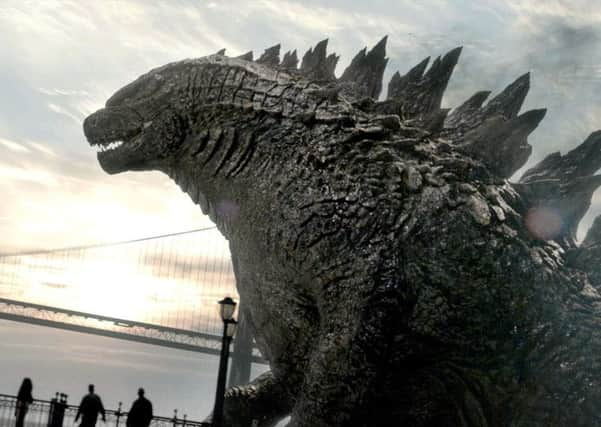Brand new take on classic monster movie


Sitting with the cast of his $160 million reboot of Godzilla Gareth Edwards could be forgiven for looking shell-shocked.
It’s not long since he was labouring on his feature debut, the festival smash that was Monsters, and composing modest yet impressive special effects in his bedroom.
Advertisement
Hide AdAdvertisement
Hide AdNow he’s unleashing arguably the biggest and baddest of movie monsters to a new audience in a film of colossal ambition that combines the threat of nuclear holocaust with the might of Mother Nature – and, of course, a gargantuan lizard laying waste to civilisation.
What’s more Edwards was sought out to direct the project by producer Thomas Tull who confesses to being “astounded by what he did for such little money. He’s the only director we ever talked to about it.”
To go from homegrown, tiny and no-budget to Hollywood and megabucks is like leaping to the moon. Edwards dealt with it in canny fashion.
“The thing I was most surprised about [is that on a small film] there’s five of you and then you enter this world where there’s 300 people. You think there’s going to be a massive difference,” he confides.
Advertisement
Hide AdAdvertisement
Hide Ad“But you drive onto set and as a director they drive you straight to the camera and you don’t meet anybody. You just talk to the assistant director, to the cameraman and the actors. You know five people.
“You feel protected and I convinced myself that I was making this intimate movie with five people. I just had 300 spectators around the sides.”
Given the – pun unintended – enormity of the task facing him Edwards’ approach was clear-eyed and logical. If the heritage of Godzilla – Japan’s premier scaly hero, king of the monsters and a cultural and cinematic icon – bothered him he shrugged it off.
Instead he appears to have embraced the beastie’s status in the belief that he was both evolving and paying tribute to the classic Toho movies of the past. The fact that 2014 marks Godzilla’s 60th birthday is but a coincidence…
Advertisement
Hide AdAdvertisement
Hide Ad“Sixty years in Japan means a rebirth so that’s highly appropriate,” he smiles. “I’d like to say we were really clever [and that] we totally planned it that way but we just got lucky in that sense.
“The first thing you do on Day One is sit down and say ‘What is a Godzilla movie? What is it about?’ It’s not an easy answer. What we arrived at is that Godzilla represents nature.
“The other things [in the film] represent man’s abuse of nature. The more we think we can contain it, something goes wrong, especially with nuclear power. It always backfires. When we landed on that, we tried to emphasise that as much as we could.”
Edwards’ approach to the material also steered him away from the current crop of comic book and superhero flicks with their over reliance on in-jokes and nudge-nudge references.
Advertisement
Hide AdAdvertisement
Hide AdHe also sought to revisit the films of his youth – another nod to a time when movies relied on story rather than an abundance of effects and wisecracking stars.
“One of the reasons Godzilla has stood the test of time is because there are so many different ways you could have gone with this film – kind of an infinite canvas. It took us a year and a half of playing around with story.
“I grew up with those 70s and 80s movies, those early Spielberg-type things and it was before the era of digital technology.
“And because they couldn’t always show the creature constantly the first half of the movie would be [comprised of] these little glimpses [that built] your sense of anticipation – like Alien from Ridley Scott. You’d just get so many chills and goose bumps.
Advertisement
Hide AdAdvertisement
Hide Ad“I feel in modern cinema it’s so easy to throw everything at the screen that we have missed that storytelling. So from day one I’d have constant references to things like Jaws and Close Encounters.”
I suggest that part of the film’s strength is that it plays it straight. This new rendition of Godzilla is a plausible disaster movie with a monster at its core. When people run they do so in complete and utter terror. Thus Edwards plays it straight.
“I love to take these sorts of things seriously. If this happened – if there really was a giant monster that came out – it would be the most horrific world-changing event ever.
“It would be like World War II or even worse. We wanted to take it seriously: as an emotional life-changing event. These things are most fun for me when you really believe it and get pulled into that world.
Advertisement
Hide AdAdvertisement
Hide Ad“There is some comedy within the film but the important difference is that the characters aren’t finding it funny.
“A filmmaker can find things funny and show things that make you chuckle but the characters are going through a traumatic time, so there shouldn’t be wise-cracking one-liners.”
The industry is now buzzing around the possibility of a Godzilla sequel.
For Edwards it’s all too soon. Instead he thinks back to the dim and distant past and a student short called Arrivals.
Advertisement
Hide AdAdvertisement
Hide Ad“You know what’s funny about Arrivals, a film no-one’s ever going to see? It was a monster movie made in 1996. As a kid I got thrown out of class at age ten and remember storyboarding a little short film.
“I always wanted to do this but I never expected it to happen. This is just so surreal that if I think about it too long I either get emotional or start to get the shakes. I can’t process it.”
And a sequel?
“Let’s let it play out and see how people respond.”
• Godzilla (12A) is on saturation release.